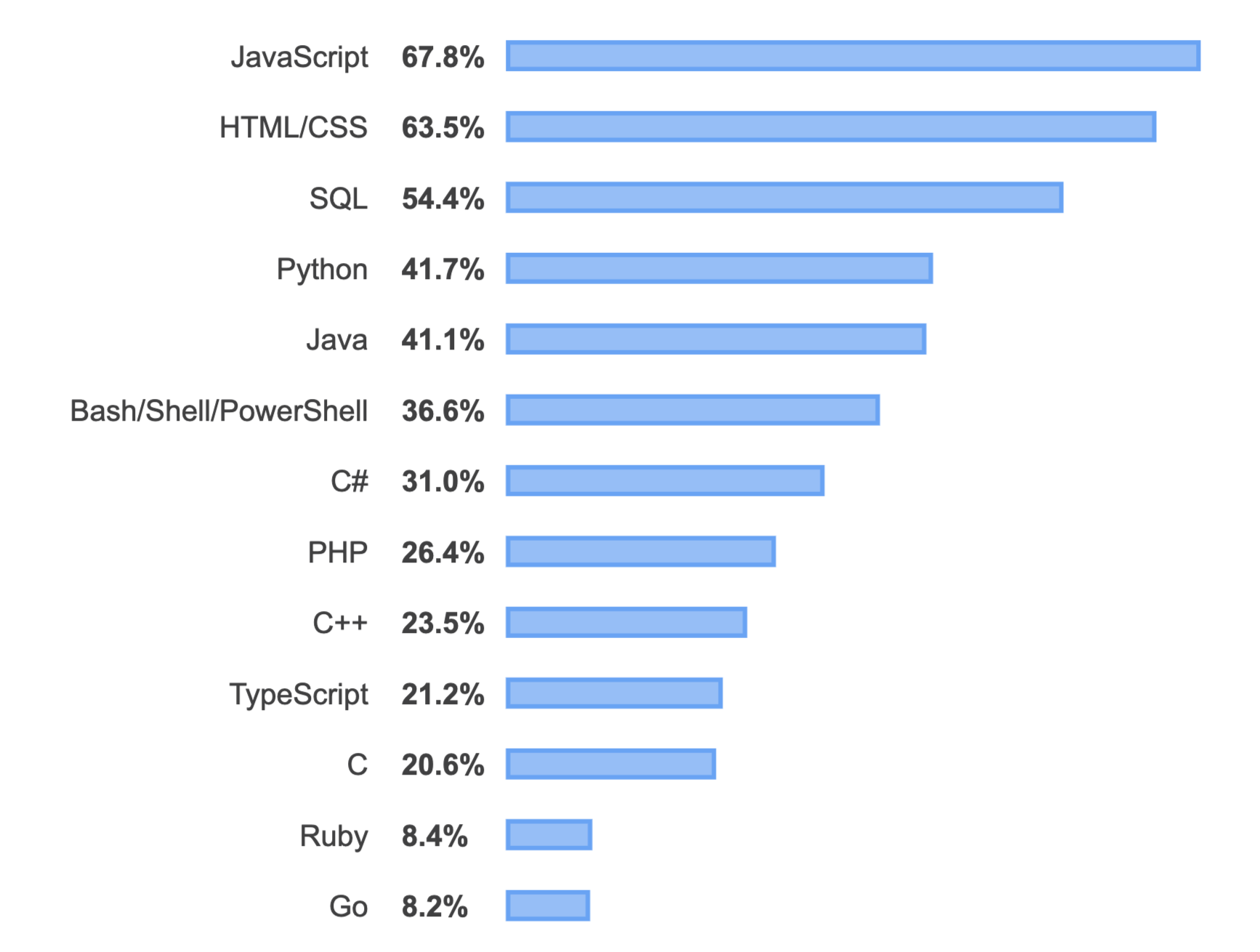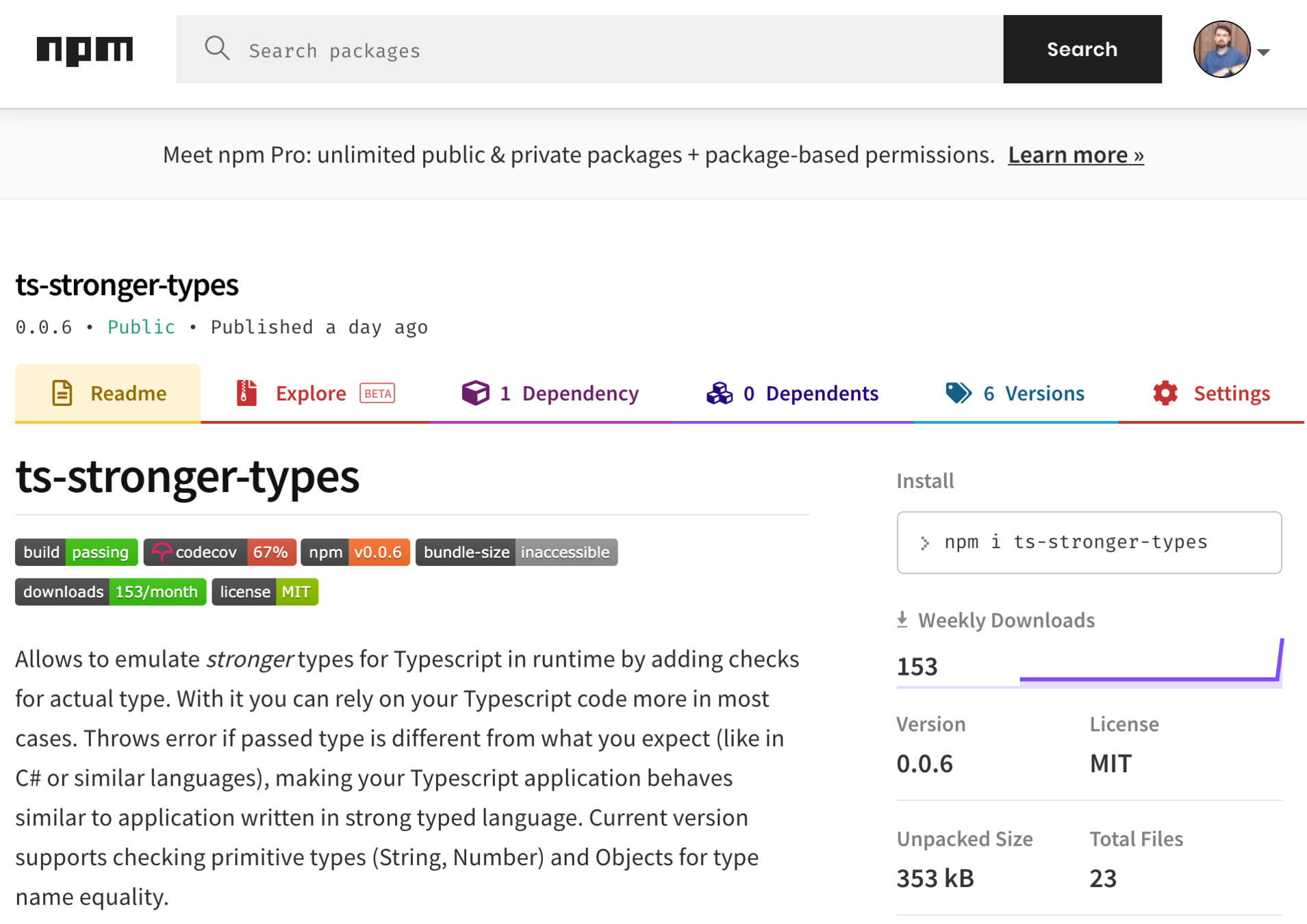Runtime Type Safety in Typescript
@ValentinKononov



@ValentinKononov

Javascript Intro

Where we can use

- Started in 1995 by Netscape Navigator and SUN
- Created by Brendan Eich
- To add interactivity to HTML
- For designers
«The World’s Most Misunderstood Programming Language Has Become the World’s Most Popular Programming Language»
Javascript Intro

Javascript Intro
> '5' - 3
> '5' + 3
> '5' + - '2'
> 5 + {v: 2}
> 5 - {v: 2}
< 2 // Number < '53' // String< '5-2' // String< '5[object Object]' // String< NaN // NaN NumberJavascript Intro
> typeof "hello world"
< "string"
> typeof new String('hello world')
< "object"- Function is object
- Objects of Different types can behave similarly
- Prototypes instead of classes
- Dynamics everywhere
- No real private members
- ....
Typescript

- Introduced in 2012 by MS
- JS code is valid TS code
- Object-Oriented
- Strong-Typed
- Compilation

Strong or Weak Typed Languages
Typescript
Typescript Creator
Anders Hejlsberg created:
- Typescript
- C#
- Delphi
- Turbo Pascal
ANYthing
usage of Any in typescript
@ValentinKononov

public ngOnInit(): void {
const movie = {
name: 'Game of Thrones',
};
this.showToast(movie);
}
private showToast(item: any): void {
this.toaster.show(`Today's movie is: ${item.name}`);
}public ngOnInit(): void {
const movie = {
title: 'Game of Thrones',
};
this.showToast(movie);
}
private showToast(item: any): void {
this.toaster.show(`Today's movie is: ${item.name}`);
}'Undefined' in message
ANYthing
use interfaces and classes
interface Movie {
name: string;
}
public ngOnInit(): void {
const movie: Movie = {
name: 'Game of Thrones',
};
this.showToast(movie);
}
private showToast(item: Movie): void {
this.toaster.show(`Today's movie is: ${item.name}`);
}TS2339: Property 'name' does not exist on type 'Movie'.
interface Movie {
title: string;
}
public ngOnInit(): void {
const movie: Movie = {
name: 'Game of Thrones',
};
this.showToast(movie);
}
private showToast(item: Movie): void {
this.toaster.show(`Today's movie is: ${item.name}`);
}ANYthing
@ValentinKononov
Typescript Pipeline

- Write TS code
- Compilation (transpilation)
- static code analysis
- type checks
- tests
- Javascript
- JS runs in node or browser
- No types
TS Code Pipeline
Typescript

// Typescript
export class SampleService {
public multiply(num: number, num2: number): number {
return num * num2;
}
}
// Javascript
"use strict";
Object.defineProperty(exports, "__esModule",
{ value: true });
class SampleService {
multiply(num, num2) {
return num * num2;
}
}
exports.SampleService = SampleService;
Sample
How we can trick TS?

const arg1 = 2, arg2 = 3;
const result1 = service.multiply(arg1, arg2);
// result = 6
const arg1 = 2, arg2: any = '3';
const result1 = service.multiply(arg1, arg2);
// result = 6const arg1 = 2, arg2: any = 'foo';
const result1 = service.multiply(arg1, arg2);
// result = NaNconst arg1 = 2, arg2: any = { name: 'foo' };
const result1 = service.multiply(arg1, arg2);
// result = NaNconst arg1 = 9, arg2: any = '9';
const result1 = service.sum(arg1, arg2);
// result = 99Potential issues
Who cares?

// usage of ANY
const arg1: any;
function (arg: any) {...}// usage of literal properties
const obj = getObj();
someFunc(obj['prop']);- ANY in code
- Literal Property Access
- In Library: any outside calls
- On Backend: Request from Frontend
- On Frontend: Response from Backend
- On Frontend: potential attack, code-breaking
- Pure Javascript as part of Typescript code
- Validation of HTTP requests / responses
- Tests
- Manual checks
multiplyChecked(num: number, num2: number): number {
if (typeof num !== 'number') {
throw Error(`Wrong arg 1: ${typeof num}`)
}
if (typeof num2 !== 'number') {
throw Error(`Wrong arg 2: ${typeof num2}`)
}
return num * num2;
}
Solutions
@ValentinKononov
Easy Solution

@Typed()
public multiplyChecked(num: number, num2: number): number {
return num * num2;
}Decorator
import 'reflect-metadata';
export function Typed() {
return (target: Object, propertyName: string,
descriptor: TypedPropertyDescriptor<Function>) => {
const method = descriptor.value;
descriptor.value = function() {
checkTypes(target, propertyName, arguments);
return method.apply(this, arguments);
};
};
}Under the hood
function checkTypes(
target: Object, propertyName: string, args: any[]): void {
const paramTypes = Reflect.getMetadata(
'design:paramtypes', target, propertyName);
paramTypes.forEach((param, index) => {
const actualType = typeof arguments[index];
const expectedType =
param instanceof Function ? typeof param() : param.name;
if (actualType !== expectedType) {
throw new Error(`Argument: ${index} of function ${propertyName}
has type: ${actualType} different from
expected type: ${expectedType}.`);
}
});
}Under the hood
Decorator Details
@ValentinKononov
- target: Object - an instance of the class, where the function was called
- propertyName: string - function name
- descriptor: TypedPropertyDescriptor<Function> - how we can replace or call initial function
Performance
@ValentinKononov
±0.2 ms
overhead for type checks

NPM Package

npm install ts-stronger-types --save@ValentinKononov
Other Options

IO-TS
@ValentinKononov
Runtime type system for IO decoding/encoding
import * as t from 'io-ts'
const User = t.type({
userId: t.number,
name: t.string
})
npm install io-tsSuperstruct-TS
@ValentinKononov
Typescript customer transformer for json validation based on type
import { validate } from "superstruct-ts-transformer";
type User = {
name: string;
alive: boolean;
};
const obj = validate<User>(
JSON.parse('{ "name": "Me", "alive": true }'));
npm install superstruct-ts-transformerClass-Decorator
Validation with TypeScript decorators
export class Post {
@IsString()
title: string;
@IsInt()
@Min(0)
@Max(10)
rating: number;
@IsEmail()
email: string;
@IsDate()
createDate: Date;
}
validate(obj)
.then(() => {...})
.catch(err => {...})validate(obj)
.then(() => {...})
.catch(err => {...})npm install class-validators --saveAuto Smoke Test
@ValentinKononov
Solution from friends research
- mark every meaningful function/endpoint with some attribute
- in tests call EVERY such function
- SUCCESS if not failed
Conclusion
@ValentinKononov
- Think about runtime
- Make code predictable
- Test your code
- Use validation when it makes sense
- Enjoy coding!
